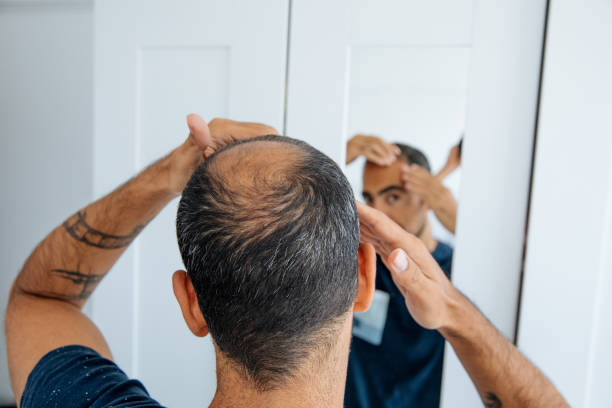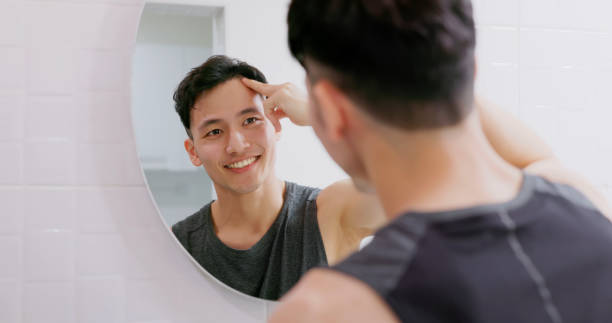Typically, we think of hair loss and male pattern baldness as something that happens in middle- or old-age. But in reality, many men start losing hair in their 20s or 30s, or even as young as their teen years. While this type of hair loss is completely normal and incredibly common, many men still experience significant distress when it happens.

Some men seek treatment for their hair loss, while others accept it and even ultimately find a sense of style or identity in their baldness. But either way, the psychological impacts of hair loss are numerous, and societal expectations can make things even worse. Here are some of the reasons why hair loss can be so difficult for young men, and ideas about how to cope.
Stigma Around Getting Help
Many, if not most men, struggle to ask for help with something as simple as getting driving directions to a new location. They’d rather figure it out for themselves, even if it means winding up hopelessly lost, than admit they could use a hand. In American culture, especially, relying on others is often considered a sign of shame and weakness in men. And when a man’s self-esteem and pride have already taken a hit from hair loss, it can be that much harder to ask.
Unfortunately, this shame around asking for help poses a major barrier to coping with early hair loss. Men who could easily access effective treatments like minoxidil, finasteride, or hair restoration surgery can’t seem to make themselves take that step. In the past, when the only option was to go to the drugstore or the doctor, it was even harder. With modern online services, men can bypass this emotional hurdle by getting medications from the privacy of their homes.
Unrealistic Comparisons
With the rise of online dating and social media, people are arguably judged more by their looks than ever before. Men who might otherwise win a date with charm or sense of humor are simply swiped left on and ignored. There’s a strong case to be made for finding more opportunities to socialize and meet people in the wild. But in the U.S., especially in rural areas, many folks don’t have access to things like dance classes or trivia nights.
As a result, young men often rank their appearances against whoever they see as their virtual competition on social media. They’re comparing their hairlines not to their balding neighbors’ but to airbrushed TikTok and Instagram influencers with thousands of followers. Hair loss is often preventable or even reversible, and treatment may boost men’s online dating success. At the same time, hair loss might not feel like as much of a crisis in a less image-focused world.
Pressure to Repress
Hair loss often hits younger men especially hard because the pressure to keep quiet can intensify emotions. Men in today’s society are often taught that being masculine is all about repressing your feelings and acting indifferent. Neostoic ideals tell men that the least-masculine thing you can do is express your emotions in front of others. As a result, men who experience grief or loss of self-esteem have no outlet for expressing their pain or sadness.
In an ideal world, young men would talk to their peers and close confidantes about their hair loss fears. And in doing so, they just might see how many other men struggle with hair loss or other body image issues. They might find relief in knowing that, while they worry about going bald, their buddies are panicking about seeming too fat or too short. They might also find comfort in realizing they have friends who are also secretly coping with or treating their own hair loss.
Social Isolation
In some cases, the problem with confiding in friends about hair loss isn’t just shame about opening up and sharing feelings. A growing issue in modern American culture is that many men don’t have friends to turn to in the first place. In fact, in one 2021 survey, one in every five single men in America reported having zero close friendships. When they do reach out for support, young men generally look to their parents, who may not be able to relate.
Men without significant social support are likely to feel lonelier, which can lead to increased stress. In turn, stress and isolation are known to increase hair loss: some people may have even lost hair because of COVID lockdowns. Even if loneliness doesn’t cause or increase a man’s hair loss, it can still significantly worsen his frustration and self-esteem. Men coping with hair loss would be much better off in a society that facilitated stronger social connections.
Fear of Aging
Another major reason why hair loss hits so hard, especially in America, is the Western stigmatization of normal aging processes. In many Eastern cultures and indigenous or more traditional cultures, aging is seen as a symbol of pride and wisdom. The oldest person in a village, tribe, or family is seen as its strongest and most valued member. Graying or thinning hair, wrinkly skin, and other signs of aging are considered positive or even beautiful.
But in the Western world, smooth, “flawless” skin and thin, toned, muscular bodies reign because they win more likes and follows. While negative perceptions of aging are arguably a lot worse for women, they still impact men’s egos and sense of self-worth. They can also compound fears of not being virile enough, especially for young men with other potentially age-related health concerns like ED.
Redefining Masculinity
Fortunately for many young men, societal standards around attractiveness and masculinity do seem to be changing. While social media does favor and promote specific types of attractiveness, it also provides a platform for encouraging more acceptance. Gen Z has been fighting for more inclusive beauty standards and more representation of individual differences. If trends continue, some young men may find their hair loss doesn’t carry much emotional weight at all.
At the same time, many men don’t want to simply accept their body’s natural patterns of hair loss. They may love the way they look with a full, thick head of hair or find it suits their face shape better. Or they may wish to attract — or already have — a partner who cares a lot about their hairline. Whatever the reason, hair loss will always hit some men harder than others. The good news is, for these men, safe and effective treatment options abound.
Published by HOLR Magazine.


